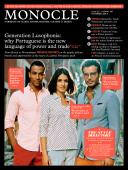
Issue 57
From Brazil to Mozambique and the Azores to Luanda, we take you on a tour of the Portuguese-speaking world – its people, policies, brands and opportunities.
In This Issue
Oops! No content was found.
Looks like we no longer have content for the page you're on. Perhaps try a search?
Return Home

